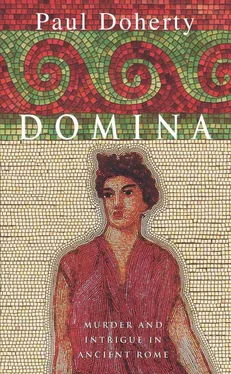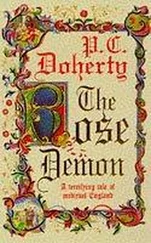Paul Doherty - Domina
Здесь есть возможность читать онлайн «Paul Doherty - Domina» весь текст электронной книги совершенно бесплатно (целиком полную версию без сокращений). В некоторых случаях можно слушать аудио, скачать через торрент в формате fb2 и присутствует краткое содержание. Год выпуска: 2012, ISBN: 2012, Издательство: Headline, Жанр: Исторический детектив, на английском языке. Описание произведения, (предисловие) а так же отзывы посетителей доступны на портале библиотеки ЛибКат.
- Название:Domina
- Автор:
- Издательство:Headline
- Жанр:
- Год:2012
- ISBN:9780755350490
- Рейтинг книги:3 / 5. Голосов: 1
-
Избранное:Добавить в избранное
- Отзывы:
-
Ваша оценка:
- 60
- 1
- 2
- 3
- 4
- 5
Domina: краткое содержание, описание и аннотация
Предлагаем к чтению аннотацию, описание, краткое содержание или предисловие (зависит от того, что написал сам автор книги «Domina»). Если вы не нашли необходимую информацию о книге — напишите в комментариях, мы постараемся отыскать её.
Domina — читать онлайн бесплатно полную книгу (весь текст) целиком
Ниже представлен текст книги, разбитый по страницам. Система сохранения места последней прочитанной страницы, позволяет с удобством читать онлайн бесплатно книгу «Domina», без необходимости каждый раз заново искать на чём Вы остановились. Поставьте закладку, и сможете в любой момент перейти на страницу, на которой закончили чтение.
Интервал:
Закладка:
I stacked all these round the corpse. I said a prayer to some unknown God, to the lightening sky or the breeze. I sprinkled incense and poured oil, and then I covered her face and climbed down. With a torch in one hand and a sword in the other, watched by slaves, some of whom may well have been in the monster’s pay, I saluted and hailed her name: ‘Agrippina, daughter of Germanicus, Imperatrix and Augusta!’ I lit the funeral pyre. The kindling roared, as the flames leapt up to the sky. The shrouded form disappeared in a sheet of blood-red fire and billowing smoke. I do not know how long I stood there watching, as the flames died and a light rain fell. I was aware of dawn, the sun rising, but still I refused to leave. I stood there until late afternoon. One of the servants brought me wine and something to eat.
‘Go on!’ she urged. ‘You must keep up your strength.’
A Praetorian came galloping through the gates, young and sharp-featured under the ornate plumed helmet. He paused, his horse’s hooves skittering on the cobbles before, yanking at the reins, he left as quickly as he had arrived. I collected the ashes in a funeral vase and buried them near Misenum on the promontory overlooking the bay. Julius Caesar had once owned a villa nearby. It had been one of Domina’s favourite spots for a picnic, where she’d sit, staring out at the sea and sky.
Afterwards I returned to Rome to watch and wait. I was left alone: there was no bill of indictment, no harassment by the secret police or the monster’s agents. It was as if I had never existed. Sometimes I received invitations to suppers at the Palatine and, occasionally, I attended. Now and again I would catch Nero watching me with those bulbous blue eyes in that fat, purpling face. He’d smile weakly and I’d smile back.
‘Nero can’t sleep at night,’ someone told me. ‘He has hideous dreams. He refuses to go back to Baiae: he claims he can hear the funeral flutes and pipes blowing from the headlands.’
I didn’t care. I haunted Rome like a prowling wolf, through the quiet districts where the nouveau riche had built their elegant mansions and laid out perfume-filled gardens. I rubbed shoulders with white-robed Arabs, Germans in their strange coats and trousers, Greek and Spanish slaves in their scarlet and gold liveries. I listened to their strange chatter and watched the aristocrats lolling in their litters. I was in the Forum in the early morning when the beautiful statues were bathed in the golden glow of the rising sun. Sometimes I’d sit at the foot of the statue of the She-Wolf, the great symbol of Rome, where an old Arab sold sulphur matches. I sniffed the odour of ripe fruit from the market and the cloying whiff of the perfumed ladies. In the afternoon I’d wander amongst the bookstalls. All the time I listened for news and scandal.
I was in the city when the monster burnt it, and the wind sent the flames roaring over the Palatine till they scorched the great Babylonian steps on the right flank of the river. Tigellinus encouraged Nero to compose a poem on the fire of Rome. Nero was stupid, or insane, enough to agree. When people pointed the finger of accusation, Tigellinus blamed that eccentric bunch of Jews known as Christians. Condemned as the perpetrators of the inferno, they were cloaked in animal skins, soaked in oil and used as human torches in the great gardens. Further arrests were made and Christians were forced to run round the amphitheatre pursued by ravenous animals. The crowds loved it. Nero boasted that he’d rebuild Rome, but all he managed was his Golden Palace, with its revolving roof depicting the sun and the moon and the main stars of the heavens. Nero would invite people to supper, bombard them with scented roses and force them to watch the revolving ceiling. They’d stagger out giddy and sick, especially if they had drunk too much Falernian.
Nero publicly proclaimed himself a great artist, poet and, above all, singer. He travelled from place to place staging performances, at which the theatres would be sealed and locked till he’d finished. One person even killed himself trying to climb the wall to escape. Women would give birth and still the monster would burble on.
Conspiracies, of course, flourished as thick as weeds in a stagnant pool. I watched as those who had hounded Domina to death met a similar fate. Burrus claimed he had a tumour in his throat. He was attended by Nero’s personal physician who gave him relief from the pain by despatching him to Hades. I held his hand as he died and told him about the horrors waiting for him. Seneca, the old fox, twisted and turned, but Nero eventually had enough of him. He died as he had lived, spouting humbug. A centurion was sent to order him to open his veins. The blood came so slowly when Seneca did this that he was forced to slash the veins in his ankles, as well as his wrists. Whilst the blood seeped out into the hot water, Seneca, that old fraud, babbled on as if he was Socrates. He even asked for hemlock! He had an eye for history, did Seneca. Yet he died as he’d lived, totally blind to the truth. When the tribunes brought the summons of death, I managed to sidle in amongst his acquaintances and clients, and when the fatal moment came, I slyly drew alongside him to whisper in his ear that Agrippina would be waiting for him on that far, dark shore.
What of Tigellinus and Locusta? Nero didn’t kill them, but others did. I watched Locusta being paraded through Rome before she was strangled, and, catching her eye, I made the sign, the well-known curse for someone about to enter the underworld. Others died just as violently. Poppea, who had replaced Acte in Nero’s affections, became pregnant and Nero kicked both mother and her unborn child to death in a fit of rage. Little Octavia had already been banished and invited to open her veins. The poor girl was so terrified that the blood didn’t flow so they drowned her in boiling water. Nero had wanted to divorce her so he could marry plump Poppea, and tried her on trumped-up charges of adultery.
‘Who with?’ Octavia cried.
Nero cast about for a name and came up with that of his old friend Anicetus.
‘Confess you slept with Octavia!’ Nero insisted. ‘Or I’ll put you on trial for murdering my mother!’
Anicetus confessed and was given comfortable retirement in Sardinia; which is where I caught up with him. He was washing his clothes in a vat of greasy water when I cut his throat. I had spent six months of my life hunting him down. All the others went into the darkness, some quietly, some cursing.
Nero went from bad to worse. He became a new Caligula, his depravity and cruelty shocked all. He plundered the treasury and made the imperial throne a laughingstock. In the provinces the discontent spilled over until Vindex, Governor of Spain, rose in rebellion and marched with his troops on Rome. It was the opportunity I had been waiting for. As Nero panicked, I joined his household, bringing false comfort and promises. Nero had changed. His face was coarser, vein-streaked, his neck fat and thickset, his stomach bulging out in a sack-like paunch. To the very end he didn’t believe what was happening. He grasped my hand, tears brimming his eyes.
‘I’m glad you’ve come, Parmenon,’ he whispered. ‘At a time like this, I need my friends and allies.’
He was totally forgetful of that dark, wind-swept evening in Agrippina’s villa. Portents started to appear all over Rome. I did give these a little help and tied a bag to one of his statues with the phrase:
‘TRULY HE DESERVED THIS’: a menacing reminder of Agrippina’s murder. The bag was a symbol of the ancient punishment for a matricide: to be sewn into a sack with a cook, a goat, a viper and an ape and thrown into the sea. Such auguries unnerved Nero. He dragged me into his bedchamber which looked unclean and badly swept.
Читать дальшеИнтервал:
Закладка:
Похожие книги на «Domina»
Представляем Вашему вниманию похожие книги на «Domina» списком для выбора. Мы отобрали схожую по названию и смыслу литературу в надежде предоставить читателям больше вариантов отыскать новые, интересные, ещё непрочитанные произведения.
Обсуждение, отзывы о книге «Domina» и просто собственные мнения читателей. Оставьте ваши комментарии, напишите, что Вы думаете о произведении, его смысле или главных героях. Укажите что конкретно понравилось, а что нет, и почему Вы так считаете.












